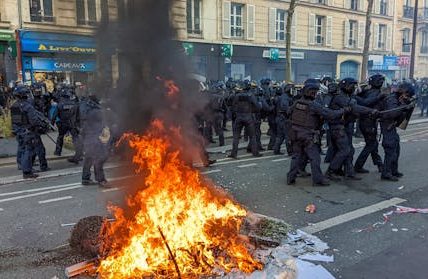Troops on US streets in more ways than one while Trump considers axing Aukus defence pact
This article was first published in The Conversation UK’s World Affairs Briefing email newsletter. Sign up to receive weekly analysis of the latest developments in international relations, direct to your inbox.
It’s Donald Trump’s birthday this weekend, and he is planning a big bash to celebrate. There will be a full-colour parade in the nation’s capital. Expected to attend are a whole bunch of military vehicles, from a second world war bomber to M1 Abrams battle tanks to Paladin self-propelled howitzers.
The cavalcade will take a route through the grander streets of Washington DC making its way along Constitution Avenue all the way to the Lincoln memorial, with an expected 6,600 soldiers in attendance. The whole thing is estimated by the Associated Press to cost around US$45 million (£33 million).
This splashy show of Trump’s power and the US’s military strength could serve as a warning to anyone who was thinking of crossing the US right now. Trump is, of course, the commander-in-chief of the US forces. And he was using the full strength of his position, some argue going beyond it, when he sent the national guard and the marines – bypassing the state governor – to the streets of Los Angeles in the past few days.
There are now, according to ABC News, more US troops on the streets of LA than in Syria and Iraq. This was necessary, Trump claimed, to address protests over immigration raids that broke out around LA. Something that Sean Parnell, chief Pentagon spokesperson, said this week was “exactly what the American people voted for”.
While Trump is testing how far he can flex his political and military muscle at home, as the Open University’s Sinead McEneaney has detailed, he is also using what some historians have called unprecedented use of power, by sending in the marines to take action against Americans, while California governor Gavin Newsom said the troops were not wanted, or needed.
Newsom is pushing back hard, and publicly, against Trump. Something, that Natasha Lindstaedt at the University of Essex, believes could propel Newsom higher up the Democrat selection list for a presidential nomination.
Read more:
Trump’s use of the national guard against LA protesters defies all precedents
Sign up to receive our weekly World Affairs Briefing newsletter from The Conversation UK. Every Thursday we’ll bring you expert analysis of the big stories in international relations.
While signalling his military strength to those on the streets of California, Trump has also been sending a strong message to his erstwhile international allies that he might not be quite as willing to share his military hardware with them as they might have thought they had been promised. The US administration has opened a review of the Aukus (the Australia, UK and US defence pact) and in particular its nuclear submarine deal, to see whether it meets the “America first” criteria. This deal was due to help all three countries scale up their submarine capacity.
Australia already transferred US$500 million to the US this year, as part of a down payment on the deal, with the expectation of receiving used US submarines in the near future. Canberra and London have been speedily revising their reliance on Trump as a security partner in the past few months. This is yet another signal from Washington that they definitely should.
John Blaxland , a professor at the Strategic and Defence Studies Centre, Australian National University, argues that Trump is angling to renegotiate the Aukus deal but won’t scrap it.
“There are a few key reasons for this. We’re several years down the track already. We have more than 100 Australian sailors already operating in the US system. Industrially, we’re on the cusp of making a significant additional contribution to the US submarine production line. And finally, most people don’t fully appreciate that the submarine base just outside Perth is an incredibly consequential piece of real estate for US security calculations.”
Read more:
Trump may try to strike a deal with AUKUS review, but here’s why he won’t sink it
Meanwhile, Mark Beeson, an adjunct professor at the University of Technology Sydney and Griffith University, believes that Australia is locked into the foreign and strategic policies of “an increasingly polarised, authoritarian and unpredictable regime” and should rethink its international relationships.
Beeson quotes an essay from another Australian academic, Hugh White, from Australian National University: “It is classic Trump to expect more and more from allies while he offers them less and less.”
Read more:
Goodbye to all that? Rethinking Australia’s alliance with Trump’s America
Russia’s battlefield count
In a military arena where most of the world would like Trump to apply a little more pressure, he continues to hold back and Vladimir Putin continues not to do a peace deal. Putin showed no sign of calling off his troops (or drones) from attacking Ukraine this week.
But as the onslaught continued Russia is expected to hit a horrific target this month, 1 million casualties in the war. Hundreds of thousands of Russians have died forcing Putin to get increasingly creative in coming up with ways to fill the gaps on the battlefields.
According to some reports he is sending the wounded back to fight before they are fully recovered, as well as offering large financial incentives to those who join up, and their families. The conflict continues and the death toll does, too. As Russian politics expert Jenny Mathers at the University of Aberystwyth points out, even before the war the country had a demographic crisis, and now that is even more extreme.
Russian women who want to earn the newly reinstated “Mother Heroine” award by bearing and raising ten or more children may struggle to find men to father them now, and after the war. Putin, like Trump, is fond of suggesting there is a glowing future for those who support him. The Russian leader has even created a Time of Heroes programme for war veterans who are promised a fast track into an elite career on their return from battle. Whether, of course, they do return when an estimated 53 casualties are being lost per square kilometre of land gained in eastern Ukraine is not a gamble many would like to take.
Sign up to receive our weekly World Affairs Briefing newsletter from The Conversation UK. Every Thursday we’ll bring you expert analysis of the big stories in international relations.


